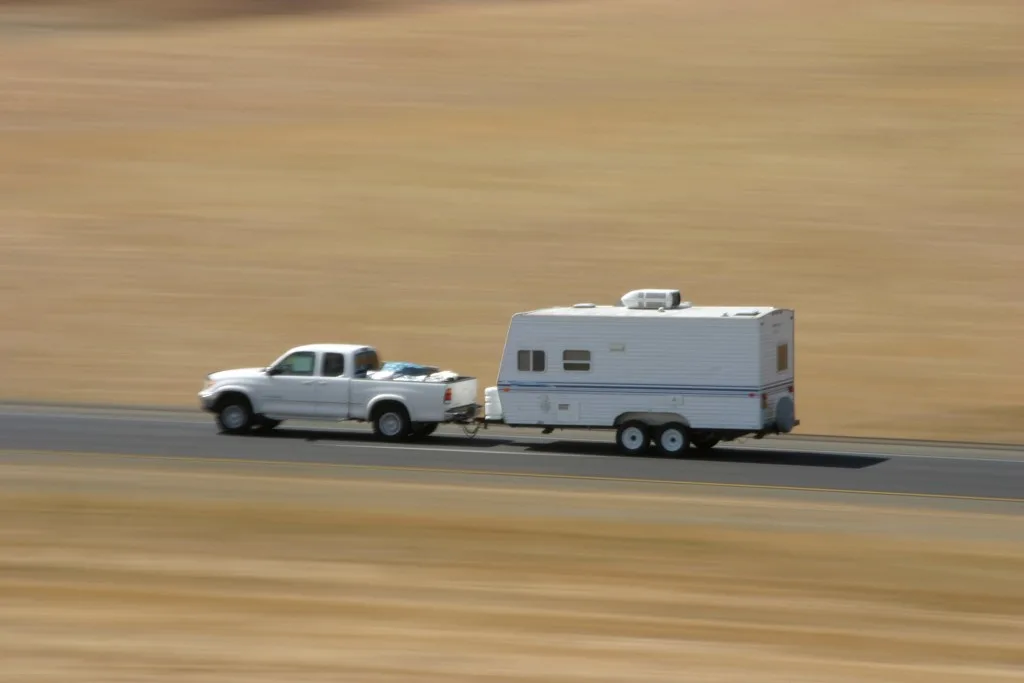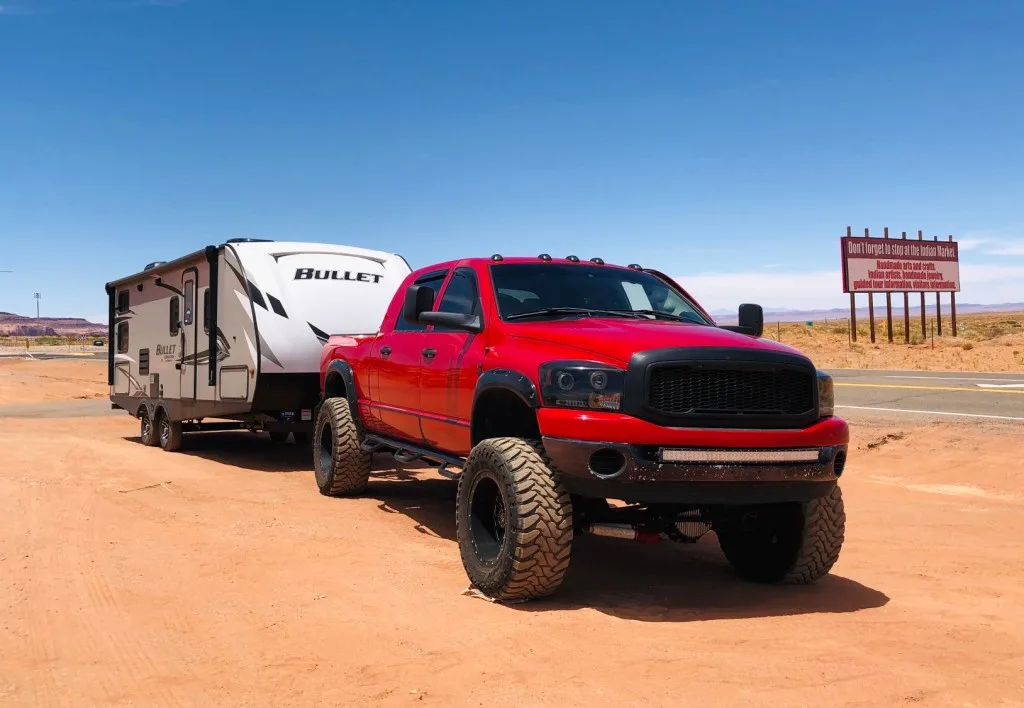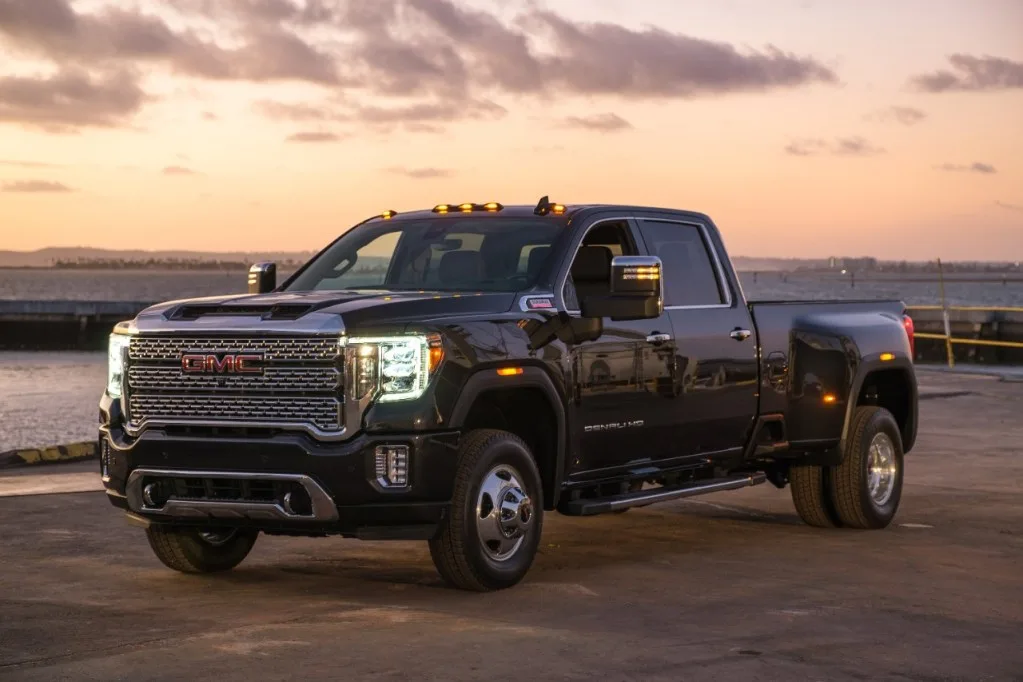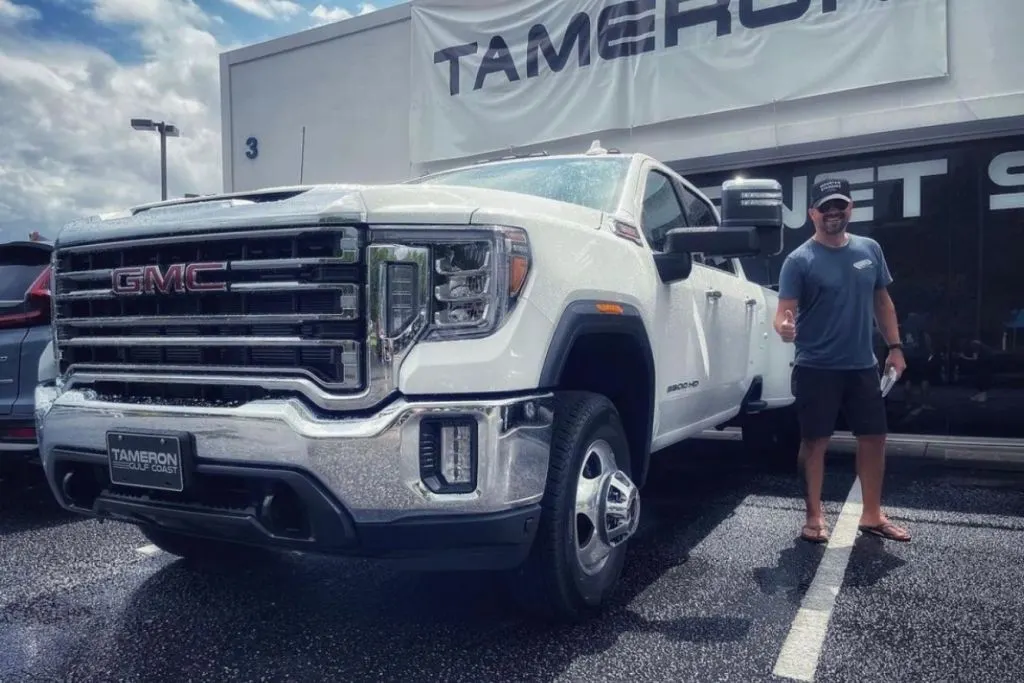So you think you know all there is to know about tow capacity.
You probably do have a better handle on towing than the average person, but did you know tow capacity isn’t the only thing you need to think about when choosing an RV?
Let’s take a closer look at what towing capacity is and why there are other important factors to consider.
Think Towing Capacity Is the Only Thing That Matters? Think Again
Many RVers think towing capacity is the only thing to pay attention to when choosing an RV and tow vehicle.
Although it’s a very important number, it isn’t the only number you need to know. Towing capacity is the amount of weight your tow vehicle can pull safely. You may void your warranty if you exceed the towing capacity and something happens.
You could put yourself and other drivers around you at risk if you try to tow more than your vehicle can handle.
So indeed, tow capacity is very important. But payload capacity and cargo capacity are just as important. How much you load into your tow vehicle and RV can also cause problems if you overload them.

Understanding Max Towing Capacity
Max towing capacity means the manufacturer has set a limit on the amount of weight this particular vehicle can tow safely. Even identical models will have different tow capacities based on bed length, engine, axle rating, etc.
So if you get a brand new F-250 and your neighbor also gets one, the towing capacities may not be the same.
It’s important to know the specifications of your model.
Passenger and Cargo Weight Matter, Too
When hooking up a travel trailer or fifth wheel, it’s not just the RV that matters. Include the passenger and cargo weight. Hardly ever are you pulling an empty RV, so knowing how much cargo weight is inside the RV matters.
This includes your tanks.
If your family includes two adults, two children, and a dog, you must calculate every one’s weight inside the truck.
This is why it’s important to weigh on a CAT scale when you travel. Get an accurate weight for your RV and tow vehicle to know if you’re safely under the max towing capacity.

Trailer Weights Explained
Let’s take a look at a few acronyms thrown around in the RV industry. Each acronym explains something different, so it’s important to know what each one means. You also need to know where to locate each number on your rig.
Dry Weight or UVW
The dry weight or Unloaded Vehicle Weight (UVW) is the weight of your rig when it comes off the manufacturing line.
This weight doesn’t really mean anything once you own it because often, weight has already been added to the RV. Perhaps the dealer added two televisions.
Maybe the dealer filled up the propane tanks.
CCC
The Cargo Carrying Capacity (CCC) is very important to know. This is how much weight you can safely put into your RV. For full-time traveling families, this number needs to be more than 2,000 for a realistic lifestyle.
You can usually find this number on a sticker on the door.
If you switch out the furniture, add a washer and dryer, or make any other changes, you need to be mindful of the weight change. Once you’ve loaded all of your stuff — clothes, dishes, toys, office equipment — you need to weigh your rig to make sure you’re within the limits of the CCC and GVWR.
Too much cargo weight can put added stress on the frame and cause irreversible damage to your RV.

GVWR
The Gross Vehicle Weight Rating (GVWR) is the total weight of your RV fully loaded.
After you’ve filled your rig with all of your belongings and made all the changes and updates you want, you need to visit a CAT scale to weigh your RV. The GVWR is your RV only and not your RV plus tow vehicle.
So you’ll need to weigh a couple of different ways to get the most accurate weight measurement. At least weigh your RV and truck combined and your truck by itself. You can drop your rig in an 18-wheeler parking space and weigh your tow vehicle to know how much of that combined weight is the truck.
Then subtract that number to know the weight of your rig and if you’re safely within the GVWR.
The 80/20 Rule of Towing
One safe rule of towing is the 80/20 rule. This rule states that you should only tow 80% of the maximum tow capacity.
For example, if your RAM 1500 has a towing capacity of 9,000 pounds, the 80/20 rule would tell you not to tow anything over 7,200 pounds. Why would someone follow this rule? Because it gives some cushion to that max towing capacity.
When manufacturers set the max towing capacity for each vehicle, they do so under idle conditions.
It’s not real-world driving with crosswinds and gravel roads. Leaving a cushion just provides an even safer drive with room for possible errors in calculations.
How to Properly Match a Trailer With Your Towing Capacity
So you’re ready to purchase a travel trailer and start your camping adventures! How do you know what you can safely tow?
First, know the max towing capacity of your tow vehicle. Remember, each model is different based on the vehicle’s weight, axle rating, engine type, and any modifications.
Contact the manufacturer if you can’t figure out your max tow capacity.
Always Look at GVWR, Not Dry Weight
When you’re shopping around for a travel trailer or fifth wheel, always look at the GVWR on the sticker. You can usually find this on the driver’s side on the front of the rig.
Don’t pay attention to the dry weight (UVW) because, as mentioned before, this has probably changed, and it doesn’t matter for your max towing capacity. If the GVWR is within your safe towing limits, then you can pull that rig.
Remember the 80/20 rule. If the RV’s GVWR is 9,900 and your max tow capacity is 10,000, you may want to reconsider.
Unless you don’t plan on loading lots of stuff into your RV, you’ll probably come close to that 9,900 limit.
What Happens If You Max Out Your Towing Capacity?
Just because your Toyota Tundra can tow a certain amount doesn’t mean you want to force it to. You’re putting the life of your truck at risk if you max out your towing capacity.
Big 18-wheelers have much larger tires, more powerful engines, and stronger braking systems for a reason. Towing is no small feat.
If you max out or exceed your towing capacity, you’ll eventually ruin your brake system, blow your tires, or damage your transmission. Your vehicle was designed to do certain things. But towing at capacity often was not one of those things.
The wear and tear on your vehicle could lead to repeated trips to the repair shop, or worse, cause a major wreck.

Do Your Research When Matching a Trailer and Tow Vehicle
Don’t go into an RV purchase without knowing the right details of your tow vehicle.
Do your research to make a good, safe decision. Also, know the needs of your family. If you plan on packing a lot of things to entertain your kids, you need to pay close attention to the CCC of each rig you look at. These acronyms are very important when towing an RV. Don’t ignore them or think they’re just suggestions.
Be safe on the road!
Do you know the max tow capacity of your vehicle?
Discover the Best Free Camping Across the USA
To be honest with you, we hate paying for camping. There are so many free campsites in America (with complete privacy).
You should give it a try!
As a matter of fact, these free campsites are yours. Every time you pay federal taxes, you’re contributing to these lands.
Become a FREE CAMPING INSIDER and join the 100,000 campers who love to score the best site!
We’ll send you the 50 Best Free Campsites in the USA (one per state). Access the list by submitting your email below:
And many forget braking power. That’s one of the reasons I run a modified semi truck to tow my trailer (and it carries my Jeep). All the power/torque, comfort and BRAKING possible. See my video at https://youtu.be/_L9qvY4BmtE
Does a good weight distributing hitch contribute to how much can be safely towed?